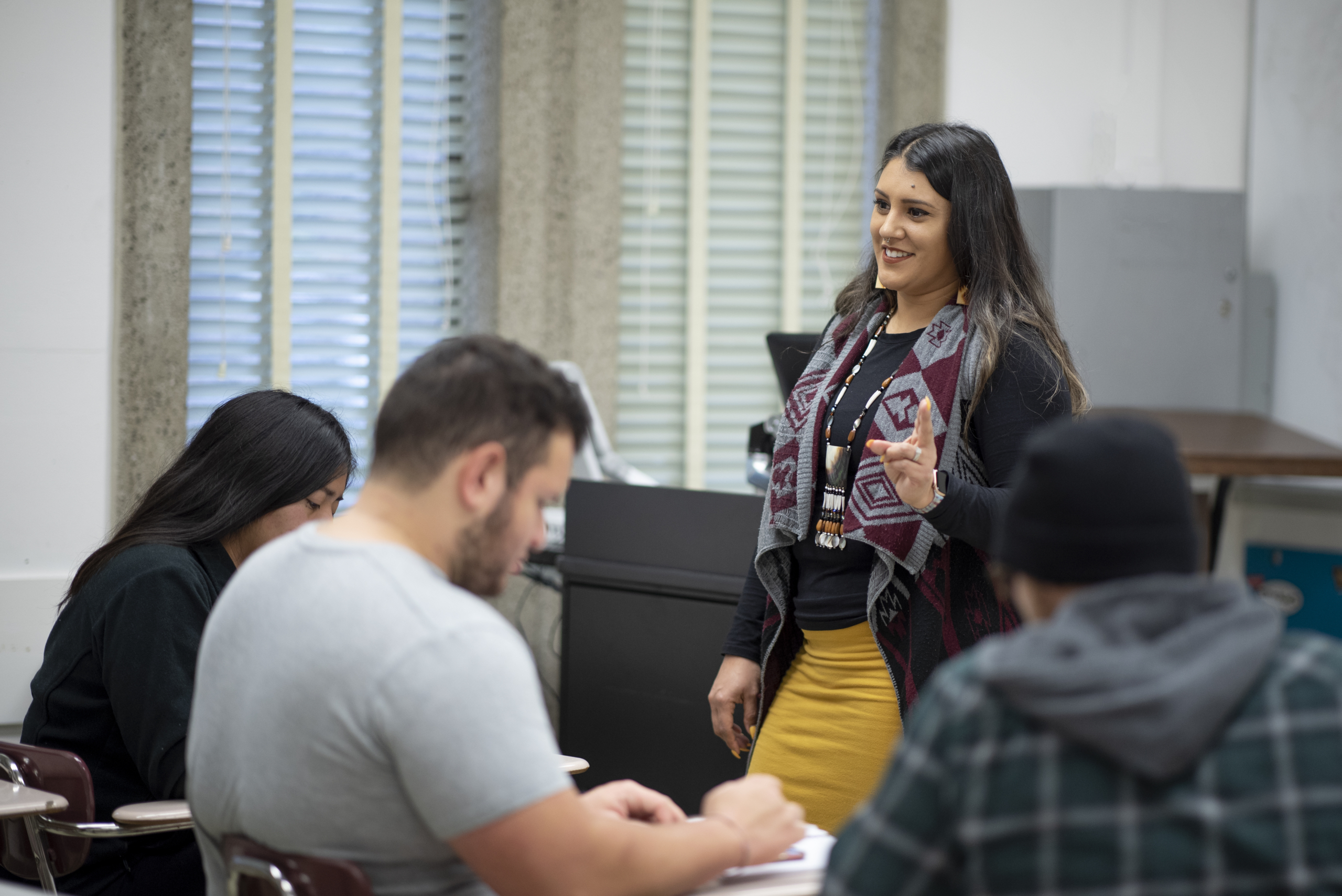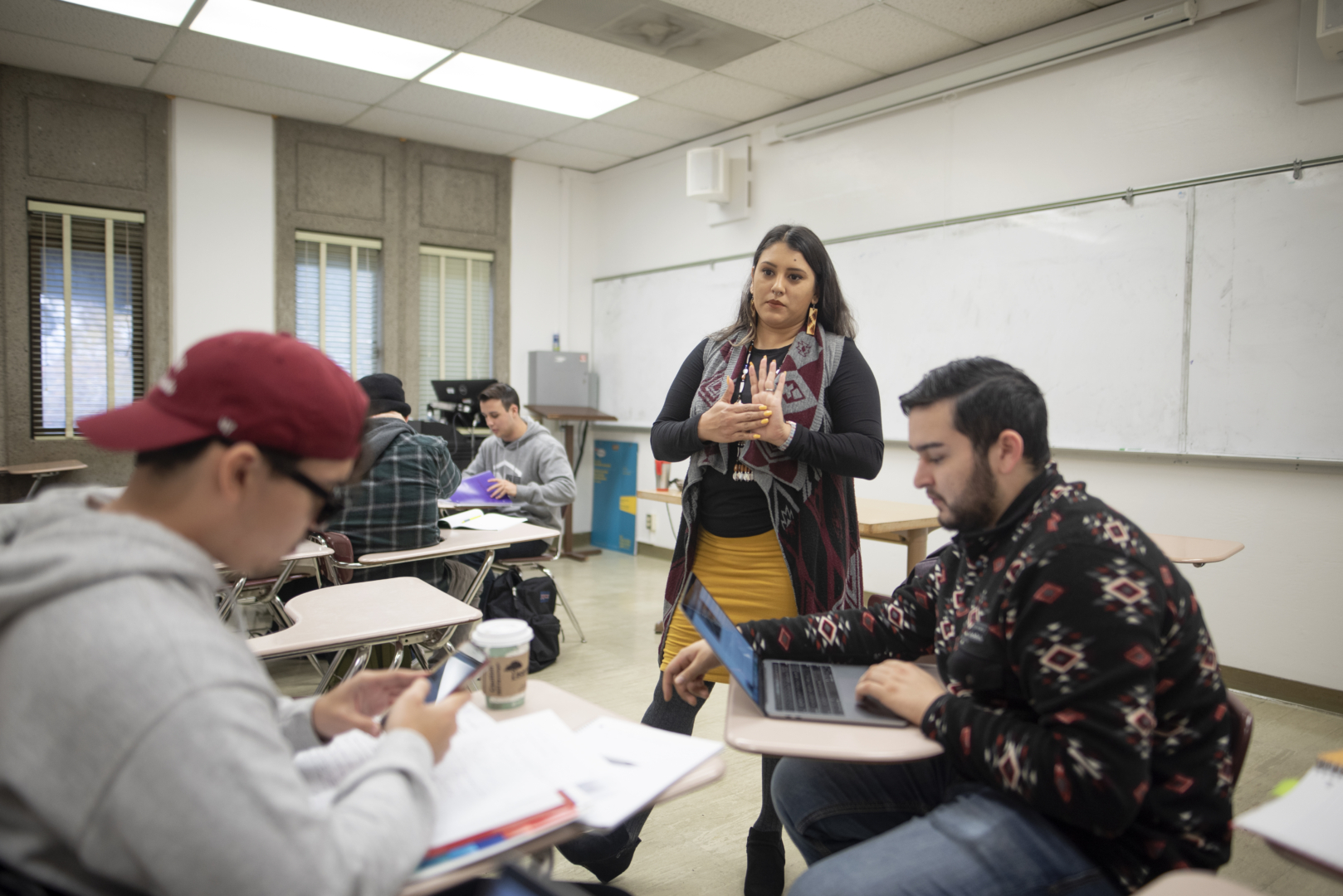American Indian Studies Professor Fuels Teaching with Experience

Visiting professor of American Indian studies Vanessa Esquivido teaches in her class on Wednesday, December 11, 2019 in Chico, Calif. (Jessica Bartlett/University Photographer/CSU Chico)
Vanessa Esquivido takes the blunt approach when it comes to teaching Chico State students about the issues, inequalities, and injustices that modern-day Native Americans still face. As an enrolled member of the Nor Rel Muk Wintu Nation, but also Hupa and Xicana, the professor said her cultural heritage, education, and personal experiences fuel her lesson plans and shape difficult but necessary conversations in and out of the classroom.
Starting as a visiting professor in fall 2019, Esquivido began teaching in the Department of Multicultural and Gender Studies (MCGS) with three classes, “Introduction to American Indian Studies,” “Introduction to Multicultural and Gender Studies,” and “American Indian Environmental Philosophies,” covering a multitude of hard-hitting topics ranging from Native sexuality to missing and murdered indigenous women and Native erasure to blood politics—just to name a few.
Part of Esquivido’s teaching pedagogy is to present current “sexy topics” that will engage students but also speak to how negatively the Native American population is still affected today, instead of focusing on the past. However, she finds that at the start of each class she is having to cover the basic question of “What is a Native American?”—a question that should be taught before the college level, she said.
“I think [students] got enough stereotypical history,” she said, “and I get so excited and want to come in hot and talk about all these things . . . but then I have to spend the first week talking about who Native people are, what they look like, [including] that some of us look very different, some of us look white passing—we spend a lot of time unpacking just the words ‘Native American.’”
Once classes move past the introductory phase, the enlivened conversations inspire Esquivido to rewrite her lesson plans, covering the same topics in different ways or adding completely fresh ones to her syllabi because she doesn’t like to teach the same things over and over, she said. She gets energized by how her changes and new material are received.
For example, she spends a lot of time in “Introduction to Multicultural and Gender Studies” talking about blood politics and blood quantum. Blood quantum is a process to measure a person’s degree of “Indian blood” that the federal government uses to classify—or not classify—someone as Native American and is determined by the number of generations of Native people they descend from. Essentially, if your blood isn’t Native American enough, you’re not Native American, so says the government, Esquivido explained.
“In the settler nation that we currently live in, we erase Native populations,” she said. “The erasure and implementation of blood quantum lowers the numbers [of tribe citizens]. I want to see how students reacted to this topic since many probably weren’t even aware this type of politics existed.”
These conversations can be uncomfortable to discuss, Esquivido said, but they are also very important to teach because the Native American population is disappearing due to the fact that the government only allows enrollment as a citizen in one tribe, regardless of heritage, and blood quantum plays a role in that.
For instance, not unlike herself, Esquivido’s 6-year-old daughter belongs to multiple tribes (Big Valley Pomo [enrolled], Nor Rel Muk Wintu, and Hupa), but “she’s only allowed to claim one blood quantum on her Certified Degree of Indian Blood,” she said.
“I think a lot of Native people have internalized it as a determinant of (tribe) enrollment. No other race or ethnicity or nation has to worry about their blood,” Esquivido said. “So, what the United States is doing is monitoring the erasure of Native peoples, and people need to be aware of what’s happening.”

In spring 2020, Esquivido added “American Indian Sovereignty and US Federal Law” to her class load—which she was excited about teaching since “there are a lot of things going up to the Supreme Court, like the Indian Child Welfare Act,” she said, “a lot that keeps me on my toes, learning about what’s going on today with these kinds of laws, and then I get to pass that on to my students, who will hopefully pass it on to others and so on. Everyone should be aware of these laws.”
With a broader audience in mind, Esquivido also welcomes any opportunity to share her perspective beyond the classroom. She is an outspoken expert addressing racism and the misrepresentation of Native American history. In recent weeks, she has been interviewed by Capitol Public Radio and the Los Angeles Times about the glorification of white settlers such as John Sutter, the removal of a Christopher Columbus statue in San Francisco, and the renaming of Squaw Valley Ski Resort.
MCGS chair and Spanish professor Sara Cooper said that in addition to her dynamic teaching methods, Esquivido is “a fierce advocate for Native American and Indigenous rights, galvanizing scholarship, and inspiring grassroots-level activism,” and that she has already had a remarkable influence in the short year she’s been at Chico State.
“Students already have been deeply affected by her presence on campus,” Cooper said. “For example, this year the Gender & Sexuality Equity Coalition created powerful programming about missing and murdered indigenous women [inspired by Esquivdo’s teachings].”
Esquivido’s visiting professorship ended following the spring semester, but her push for relevant and critical topics on Native Americans secured her a more permanent place at Chico State as MCGS’s newest tenure track assistant professor of American Indian studies starting this fall. She looks forward to bringing “more representation and more visibility for what Native people continue to do and work on, and the troubling issues we face in today’s world,” she said.
Esquivido graduated from Sacramento State in 2011 with her BA in anthropology and ethnic studies with a concentration in Native American Studies. Currently a PhD candidate at the University of California, Davis, her dissertation focuses on a tribal ethnohistory of the Nor Rel Muk Wintu and their struggles to obtain federal recognition.


